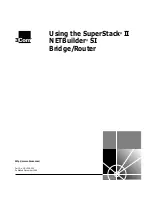
service attempts to transfer the group to the next node on the preferred owner's list. If the transfer
is successful, the resources are brought online in accordance with the resource dependency structure.
The system failover policy defines how the cluster detects and responds to the failure of individual
resources in the group. After a failover occurs and the cluster is brought back to its original state,
failback can occur automatically based on the policy. After a previously failed node comes online,
the cluster service can fail back the groups to the original host. The failback policy must be set
before the failover occurs so that failback works as intended.
Quorum disk
A Quorum disk is recommended for clusters with an even number of cluster nodes. The Quorum
disk is the shared storage used by the cluster nodes to coordinate the internal cluster state. This
physical disk in the common cluster disk array plays a critical role in cluster operations. The Quorum
disk offers a means of persistent storage. The disk must provide physical storage that can be
accessed by all nodes in the cluster. If a node has control of the quorum resource upon startup, it
can initiate the cluster. In addition, if the node can communicate with the node that owns the
quorum resource, it can join or remain in the cluster.
The Quorum disk maintains data integrity by:
•
Storing the most current version of the cluster database
•
Guaranteeing that only one set of active communicating nodes is allowed to operate as a
cluster
Cluster concepts
illustrates a typical cluster configuration with the corresponding storage
elements. The diagram progresses from the physical disks to the file shares, showing the relationship
between both the cluster elements and the physical devices underlying them. While the diagram
only illustrates two nodes, the same concepts apply for multi-node deployments.
60
Cluster administration















































